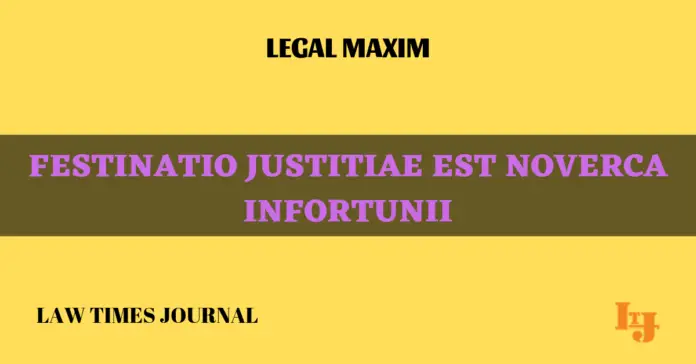
Literal Meaning
The hurrying of justice is the stepmother of misfortune.
Explanation & Origin
Origin– Festination justitiae est noverca infortunii is Latin term which means that the hurrying of the justice is the stepmother of misfortune. It means that no good comes out hurrying the system of justice.
Explanation– Misfortune means bad luck or things end badly. The term means to say that we can’t hurry the process of the law to gain justice because the justice wouldn’t be good enough. Everything needs time, and so justice should be given in the due course of the time. And yes it should take too long to.
Illustration
In the case of murder a judge can give the order as soon as he sees the cases, he has to look at the evidence and the argument then only he can give justice.
Case Reference
In the case of Mena Transport vs Assistant Commissioner [1] Justice hurried is justice buried. Rule of audi alteram partem (No one should be condemned unheard) or audiatur et altera pars (Hear the other side). Nemo in-auditus condemnari debet is non sit contumax (No man should be condemned without being heard unless he be contumacious). Qui aliquid statuerit, parie inaudita altera, acquum licet, dixerit, haud acquum facerit (He who determines any matter without hearing both sides, though he may have decided right, has not done justice). Justice should not only be done, but be seen to be done. Justice hurried is justice buried. Rule of audi alteram partem (No one should be condemned unheard) or audiatur et altera pars (Hear the other side). Nemo in-auditus condemnari debet is non sit contumax (No man should be condemned without being heard unless he be contumacious). Qui aliquid statuerit, parie inaudita altera, acquum licet, dixerit, haud acquum facerit (He who determines any matter without hearing both sides, though he may have decided right, has not done justice). Justice should not only be done, but be seen to be done. But clearly the respondent has not followed this mandatory provision and passed the order in hot haste even without following the due process of law as well as rule of natural justice and providing opportunity of hearing to the petitioner, which made the justice hurried is justice buried.
In the case of Sreenivas Basudev vs Vineet Kumar Kothari [2] it was observed The object is to expedite the hearing and not to scuttle the same. The f process of justice may be speeded up and hurried but the fairness which is a basic element of justice cannot be permitted to be buried. It is not a part of the substantive law. Substituted Order VIII, Rule 1 intends to curb the mischief of unscrupulous defendants adopting dilatory tactics, delaying the disposal of cases causing inconvenience to the plaintiffs and petitioners approaching the court for quick relief and also to the serious inconvenience of the court faced with frequent prayers for adjournments. The object is to expedite the hearing and not to scuttle the same. While justice delayed may amount to justice denied, justice hurried may in some cases amount to justice buried.
In the case of State Of M.P. vs Laxmi Chand Awadhiya And Ors[3] it was observed by the court that We have bestowed are anxious consideration and appreciated the submissions raised by the Counsel at the Bar. It is not in dispute that for the technical defect, the orders were set aside. The State should have been more careful while constituting the screening committee. The negligence shown on the part of the State is neither commendable nor appreciable. It must have kept in view the age old principle that if a certain thing is to be done it has to be done in a particular manner in the said manner or not to be done at all. As it appears in an effort to clean the augean stable, the State Government acted in a hurry and forgot the sacrosanct and sagacious saying justice hurried is justice buried. However, in view the submissions putforth by Mr. Yadav and also taking note of the fact there was a technical fallacy, we are inclined to modify the order of the Tribunal in this regard by reducing the amount to fifty per cent, and accordingly we command that the officers who have been granted benefit in entirety from 1-10-97 till 3-1-2000 shall receive fifty per cent of their lawful dues. The same shall be paid to them within a period of three months from the date of receipt of the order passed today.
Edited by Vigneshwar Ramasubramania
Approved & Published – Sakshi Raje
Reference
[1] 2006 143 STC 58 MP
[2] AIR 2007 Gau 5, (2006) 3 GLR 230
[3] 2002 (5) MPHT 228





